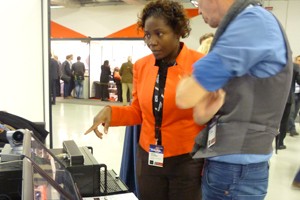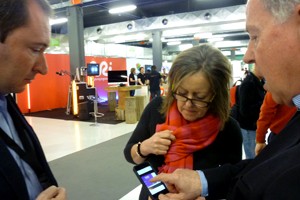The Public Media Alliance was proud to be a partner for the sixth Radiodays Europe conference which took place in Milan in March. Our CEO Sally-Ann Wilson caught up with managers from PMA member organisations to find out what they’d be taking away from Radiodays

The convention centre in Milan buzzed with more than 1,300 radio professionals from 60 countries sharing, discussing, learning – and enjoying the all-you-can eat gelato! Among the delegates was Odette Campbell Manager of Grenada Broadcast Network. She summed up the optimism about the importance of radio that ran through the conference: “When I arrived at the conference I thought of myself as the manager of one TV channel and three radio channels, by the end of Radiodays, I was manager of three radio channels and one TV channel.”
I started as the manager of one TV channel and three radio channels, but by the end of it, I was manager of three radio channels and one TV channel

Reports of the ‘death’ of radio may again prove to be greatly exaggerated. Mark Cummins from SBS Australia also noted the optimism and positivity about the future of radio at the event: “We’ve moved beyond the panic.” As Content Manager, Audio & Languages at Australia’s multicultural broadcaster, Mark had made a much longer journey than most delegates to reach Milan. His main reason for attending was to ensure that the broadcaster remains in touch with global developments and issues in radio.
Beds and Big Data
Radiodays brought together professionals from both the public and private radio sectors, which made for a dynamic mix. Although there were few specifically PSM-focused sessions at the conference, Mark Cummins was particularly encouraged by the delegates’ willingness to share solutions and experiences. The perfect multiplatform nature of radio was frequently highlighted and seemed to be the main cause for optimism.
Anthony Pugh, head of Manx Radio was joined at Radiodays by Marian Kenny, the station’s News Editor. He observed that it is difficult for smaller stations to release staff, but saw the benefit in employees attending: “It just gives you time to step back and review what you are doing and how you are doing it, he said. “It may be a tech idea from the exhibition or a production idea from a session, but it can inspire you to think in new ways about what you are doing and who your audience will be in the future… as well as who they are now.”
PMA members were especially interested in the sessions examining audience research data. Mark Cummins remarked that the era of Big Data was bringing in more nuanced information, for example, “the 55-plus audience is a growing demographic,” he noted. Radiodays also looked at radio audience behaviour, from the BBC’s ‘bed-to-bed’ analysis of a person’s listening day to studying tune-in habits throughout the week.

In terms of weekly listening patterns, Fridays tend to need high-energy programming to match listeners’ enthusiasm for the coming weekend. On Monday morning audiences are initially refreshed until Monday lunchtime, when the reality of the working week kicks in again. Sundays’ audiences typically have an ‘on-demand’ moment followed by ‘catch-up’ time on Mondays, with podcasts of course appearing to satisfy the appetite for binge listening.
‘It’s difficult to make predictions, especially about the future’
Social media and radio was of course an almost compulsory discussion topic at Radiodays. It was clear that there is no one-size-fits-all model in terms of social media integration and engagement. As a case in point, in Denmark 59% of the population use Facebook daily (one of the world’s highest penetration rates) and social media is used alongside radio more than it is with TV. Twitter, a key social media channel for radio in many countries, is far less popular in Denmark, where its usage looks to be declining.
James Neish, Head of Radio and Online at GBC in Gibraltar, concurred with Manx Radio’s Anthony Pugh on the importance of being able to access research data at Radiodays. Smaller stations can tap into research data that they would not be able to afford to do themselves. James and Anthony both agreed that hearing what industry leaders are doing at the conference helped validate decisions they may take as managers.
In just six years Radiodays has become an essential conference to attend for radio professionals in Europe. Next year’s host city is Paris. The Public Media Alliance hopes to work with Radiodays to run similar events in other regions, but in the meantime it is possible to catch up with some of the sessions from this year’s conference, via video packages at the Radiodays website.
Related Posts
11th March 2015
What to see at Radiodays Europe
10th July 2013
